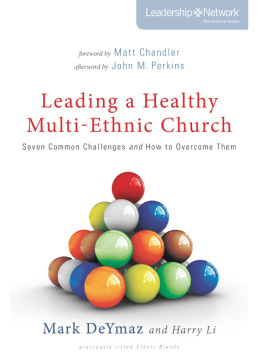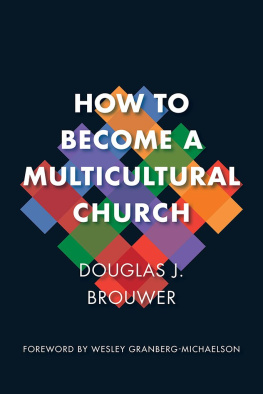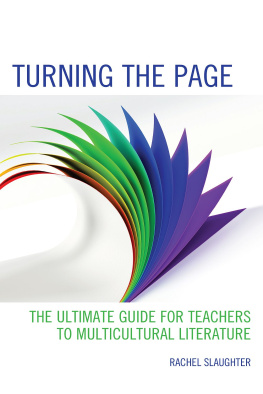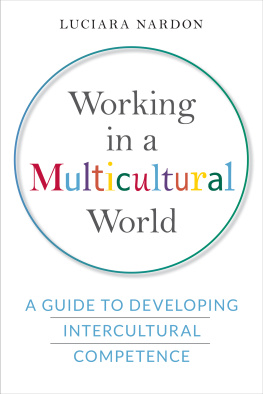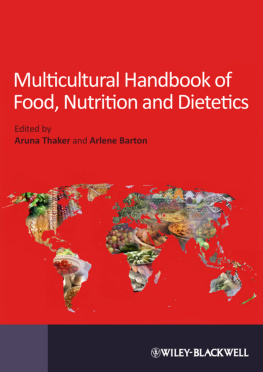THE MULTICULTURAL LEADER:
DEVELOPING A CATHOLIC PERSONALITY
CLEMENTS PUBLISHING
Toronto
The Multicultural Leader Copyright 2005, 2015
Contents
Second Edition
The first edition of this book was largely written in 2000-01 as the outcome of Masters thesis work, following five years of multicultural church planting in South Africa. Writing the book was a great opportunity to solidify a lot of my thinking and practice and to ask some new questions. The Multicultural Leader proved to be a conversation starter for multicultural ministry in Canada for good or ill. Seminaries in both Canada and the US have used the book for required reading in a variety of courses (Urban Ministry, Intercultural Communications, Leadership Development).
After more than a decade the book is still being used and regularly purchased by people involved in multicultural ministry. The thing is, Ive learned a lot more over the ensuing years! I have spent the past decade working with leaders in multi-ethnic congregations in Canada, from coast to coast, as well as with Christian leaders in such diverse cultural contexts as Hungary, Mexico, Ghana, Niger, Sri Lanka, India, and The Philippines. This updated edition of The Multicultural Leader includes insights gained as I have continued to learn and navigate my way through the challenge of engaging with friends and colleagues of diverse cultures.
To the list of intercultural coaches from the first edition (many of whom still speak into my life) I need to add: Syam Chandra, Howard Olver, Vinola Pakkianathen, Nathan and Helen Umazekabiri, Sritharan Jeyarajah, Benedict Gomez, Sok and Savy Em, Michael Tesema, Jared Siebert, Robert Cousins, Brian Seim, Ken Baker, Larry Winckles, Karen Rolston and other instructors at UBCs Centre for Intercultural Communications.
April 2015
Hamilton, Ontario
First Edition
Multicultural leaders require shaping through engagement with multiple cultures and interaction with leaders who have gone before them.
I would like to acknowledge the role of my parents, Ron and Dorothy Sheffield, in shaping my early life experience through their engagement with the multiple cultures present in Northern Ontario in the 1960s and the openness of their hearts and home to people from around the world over many years.
Likewise a number of friends from different cultures have been influential in helping me see from the others point of view. Ken Getty, Jon Bonk, Carole Guevin, Ed and Mabel Nookimas, Phil and Carmena Capp, Elesinah Chauke, Bongani Hadebe, Harold and Annette LeRoux, Joel and Letty Mayephu, David Yardy and Narendra John, just to name a few.
Dr Joyce Bellous, education studies professor at McMaster Divinity College, has been an encouraging colleague and friend, creating an environment for collaborative dialogue and philosophical refocusing.
My wife Kathy and our two children, Jamila and Jared. We have travelled the world together enjoying different people, places, cultures, languages and foods. We have learned, been challenged; we have cried with frustration and laughed with joy at our intercultural foibles and triumphs. I appreciate Kathy pushing me toward reality what does this mean, how does this work out, in real peoples real lives? I honour Kathy for making the space in our lives for this work.
Dan Sheffield
February 2004
Hamilton, Ontario
The promise of Christian scripture is that world history is proceeding toward a time when people from every nation, tribe, people and language will stand worshipping together before the throne of God and the risen, sacrificed, Lamb (Rev. 7:9,10). This picture describes a God who offers love and acceptance through that sacrificed Lamb, desiring relationship with all peoples, without negating their acquired cultural identity as shaped by geo-political frameworks, ethnicity, kinship and linguistic patterning.
An accepting God, however, is one thing a community of struggling Christians all seeking after that same recognition and pushing one another out of the way in the process, is quite another. Is it possible that people of different cultures, histories and languages can come together in multicultural communities of faith? Communities expressing acceptance of one another and working together to break down the barriers of differentiation that so easily rear up in front of us?
We should be able to say that, yes, acceptance of those who have been profoundly shaped by a cultural framework different than our own is just as possible as the notion that we are dead to our sin and alive to God and therefore able to walk in newness of life with Christ (Rom. 6). If God, through Christ, is able to bring change and renewal in this personal dimension of the human condition, surely he desires change and renewal in the dehumanizing, and often violent, interaction of peoples and cultures. Miroslav Volf suggests it may not be too much to claim that the future of our world will depend on how we deal with identity and difference.
In Exclusion and Embrace, Volf goes on to say that it will be the catholic personality who will lead us into this new form of intercultural relationship. The broad-minded, generous, inclusive person. These leaders will demonstrate themselves to be a kind of personal microcosm of the eschatological new creation. They are enriched by otherness; because they have opened up to Gods presence at the foot of the cross, they are also open to the different others who meet them there.
In this book it is my intention to explore a Christian response to our multi-ethnic urban environments and more specifically to illuminate what is required of Christian leaders these catholic personalities who develop and serve in multi-ethnic congregations.
There are several terms that are often used interchangeably in popular literature, but which provide a rich understanding when used appropriately. Two common terms are used in popular dialogue multicultural and intercultural. I will use the terms in this manner. A multicultural state creates constitutions, charters, institutions, and legal structures that fairly allow citizens who are the product of multiple cultures to live together with respect and civility. An open, accepting, inclusive, environment needs to be facilitated among people shaped by different cultures this is how I will use the term multicultural. A multicultural church intentionally tells stories, teaches a theology of diversity and creates a set of policies and practices in which people of diverse background are systemically welcomed, engaged and included.
The intercultural citizen acquires the skills to engage comfortably with the beliefs, values and behaviours of her neighbour in a manner that ultimately calls for adjustment on all sides. Within that open, accepting, environment we still have to learn how to live and engage together in practical terms this is how I will use the term intercultural. A multicultural church teaches skills and enables practices which create healthy intercultural/interpersonal relationships between people of diverse backgrounds, holding differing beliefs, values and behaviours.



